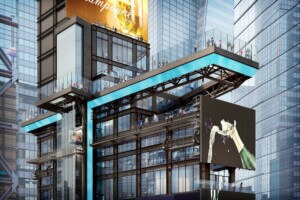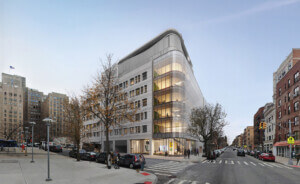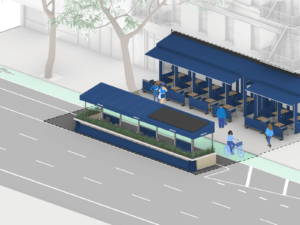The newly relocated, Brooklyn-based Van Alen Institute announced today the launch of Neighborhoods Now, an initiative spearheaded in partnership with the nonprofit Urban Design Forum that will pair more than 20 design firms with community partner organizations in four New York City neighborhoods that were—and continue to be—adversely affected by the coronavirus pandemic.
These neighborhoods—Jackson Heights, Queens, the Kingsbridge section of the Bronx, Washington Heights in Upper Manhattan, and the Bedford Stuyvesant neighborhood of Brooklyn—are home to large and diverse communities of color that have been disproportionately impacted by the pandemic both economically and in terms of overall fatalities. Like in similar neighborhoods across the country, these communities already lacked the resources and capital to aggressively respond to a crisis of such magnitude due to—as pointed out in a press statement announcing the initiative—“long-term structural inequity and racism.”
The goal of Neighborhoods Now is to assist each of these four communities in developing safe, smart, and effective reopening strategies as they each gradually emerge from the pandemic and begin the recovery process. The collaborative program, which will run through August 2020, aims to “provides the opportunity for experimentation and innovation at the neighborhood level,” as the announcement from Van Alen elaborated. “Each working group will develop tailored solutions for shared gathering spaces in those neighborhoods, which may include restaurants, storefronts, civic and cultural organizations, parks, and streets.”
The outcome will be a set of design recommendations, prototypes, and installations empowering communities to respond to their immediate needs, while contributing to the city-wide strategy on pandemic response. Recommendations will address how to reconfigure businesses to protect workers and customers; how to outfit community parks and gardens for social distancing; how to navigate permitting for sidewalk or parking lane temporary uses; or how to repurpose vacant spaces as places for convening, culture, and healing.
Each working group will include a partnering community organization representing each targeted neighborhood: the Bed-Stuy Gateway Business Improvement District (BID) and Bedford Stuyvesant Restoration Corporation (Bed Stuy), the 82nd Street BID (Jackson Heights), the Northwest Bronx Community and Clergy Coalition (Kingsbridge), and the Community League of the Heights (Washington Heights).
Coordinating design firms include Arup, COOKFOX, Kohn Pedersen Fox, Moody Nolan, and Volunteer Architects Limited, a collective comprised of ARO, LTL, MOS, nARCHITECTS, SO—IL, and WORKac. An impressive roster of architecture and landscape architecture studios will provide additional support. They include: Abruzzo Bodziak Architects; Architensions; Barker Associates Architecture Office; Bednark Studio Inc.; Brandt : Haferd; Bureau V; Büro Koray Duman; Frederick Tang Architecture; Fried Frank; Future Expansion Architects; Gensler; Grimshaw; Jaklitsch / Gardner Architects; James Corner Field Operations; Kalos Eidos; Lea Architecture; MNLA; Michael K. Chen Architecture; New Affiliates; Office of Architecture; Office of Tangible Space; Only If Architecture; Overlay Office; PARC Office; Partner & Partners; Perkins and Will; Scalar Architecture PC; Smith & Sauer; Some People Studio; Space 4 Architecture; Stantec; Studio Cadena; Studio Fōr; Studio Libeskind; W Architecture; WIP Studio; Woods Bagot; and Worrell/Yeung.
“As New York City begins the reopening process, we are optimistic about the ways our involvement in the Neighborhoods Now program will impact some of the city’s most vulnerable communities,” said Latoya Kamdang, senior associate and director of New York operations for Moody Nolan. “This moment in history also opens the door for dialogue on the critical need for organizations to implement real diversity throughout its ranks and distribution of contracts.”
A public kick-off event for Neighborhoods Now will be held via Zoom on the morning of June 26 as a means of bringing together the general public with each of the four working groups. Experts from relevant fields including public health, economic development, and material science will participate in the forum. A concluding share-out event will be scheduled for later in the summer.











